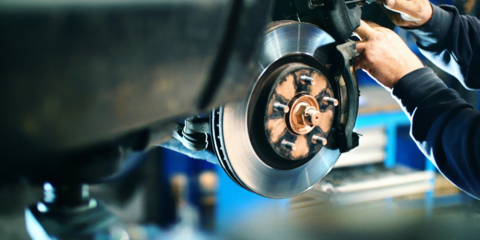
FAQs About Car Brakes and Maintenance Advice
Here are some frequently asked questions and advice about car brakes
Brakes are one of the most important safety components in your vehicle. Properly functioning brakes are absolutely critical to safe driving. Your brakes stop thousands of pounds of speeding metal, keeping you and others on the road out of harm’s way. That’s why paying close attention to your car’s brake system and staying on top of maintenance is so important. Maintaining them properly helps ensure your brakes work, after all, they are extremely important.
Here are some frequently asked questions and advice about car brakes:
What are the common signs my brakes need work?
- Squealing or grinding noises when braking - This could indicate worn brake pads
- Vibrations in the steering wheel or brake pedal when braking - This can be a sign of warped rotors
- Spongy brake pedal or the need to pump brakes - Potential issues with brake fluid or air in lines
- Your brakes are taking longer to stop the vehicle - Brakes may be worn and need need replacing
Paying attention to these warning signs and getting your brakes inspected promptly can avoid bigger problems down the road. Addressing any issues right away helps keep your brakes in proper working order for safety.
How often should brake pads be replaced?
- Brake pads have built-in wear indicators that produce a screeching noise when the pads are worn down. If you hear this sound, the pads likely need be to replaced
- On average, brake pads last 30,000 to 70,000 miles before needing replacing, however, the lifespan does depend on your driving habits and conditions
- Have your brake pads inspected regularly by a mechanic to determine if replacement is needed
Following the manufacturer's recommendations for mileage-based intervals can also help guide when to change pads. Keeping up with proper brake pad replacement helps ensure your brakes continue to operate and stop your vehicle effectively.
When do brake rotors need to be resurfaced or replaced?
- Rotors can become warped over time due to heat buildup from braking. This causes vibrations in the steering wheel and pedal. Resurfacing rotors can fix this issue
- Rotors can also develop deep grooves from worn brake pads rubbing against them, meaning resurfacing is needed to refinish and smooth the rotor's surface.
- If rotors are excessively worn, cracked, or warped beyond resurfacing limits, they will need full replacement
Addressing warped, grooved, or worn rotors promptly through resurfacing or replacement helps restore proper braking function and prevent bigger problems.
How often should brake fluid be flushed?
- Brake fluid should be flushed every 2-3 years on average. Some manufacturers recommend shorter intervals so check your owner's manual
- Fluid absorbs moisture over time which lowers boiling point. This can lead to brake fade and reduced stopping ability
- Signs like a spongy pedal, leaking fluid or warning lights indicate the need for flush
Keeping up with regular brake fluid replacement as part of routine maintenance helps ensure the hydraulic braking system continues to operate properly and prevents brake failure. Flushing fluid per the recommended schedules for your vehicle model provides optimal braking safety.
What maintenance helps prevent bigger brake repairs?
- Regular brake inspections to spot issues early
- Replacing pads and getting rotors resurfaced when needed
- Flushing brake fluid per recommended intervals
- Checking brake components for leaks/damage
- Ensuring proper tire inflation for best braking performance
Don’t put it off until you hear squealing or feel shuddering when you press the pedal. Routine brake system maintenance helps avoid catastrophic failures and reduces the chances of collisions. It also helps avoid large repair bills and reduces the risk of failures. Address any issues promptly for optimal safety. Consult a trusted mechanic for a recommended brake service schedule for your vehicle.
Investing a little time and money regularly to check your car’s brakes just might save your life.
